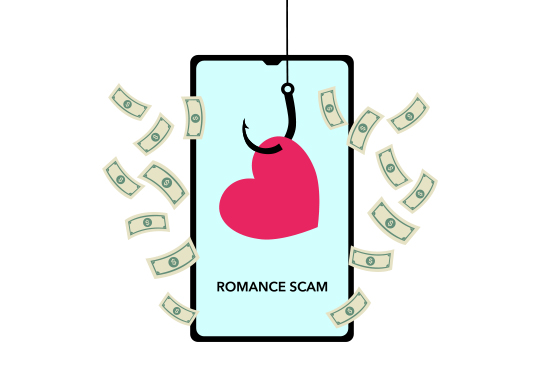Think You Can’t Fall for a Romance Scam? Think Again!

(2 Minute Read) — Imagine believing you’re in a relationship with a Hollywood star, only to discover it’s all a lie. That’s exactly what happened recently to a French woman who thought she was dating Brad Pitt. The scammer created a convincing online profile, complete with AI-generated photos and fabricated stories, to earn her trust. Over time, he spun tales of financial troubles and urgent needs, convincing her to send him her life savings. By the time she realized she’d been duped, she had sent more than $100,000 through wire transfers and gift cards.
This heartbreaking example highlights just how far scammers will go to exploit trust, and Valentine’s Day is prime time for romance scams. Whether you’re looking for love, or a scammer is looking for you, we have some tips to help protect your heart—and your wallet.
What Is a Romance Scam?
A romance scam occurs when a fraudster creates a fake identity to build a relationship—often online—with the intent to exploit trust and steal money or sensitive information. These scammers are masters of manipulation, coming up with elaborate stories to tug at your heartstrings and make you feel obligated to help them.
Common red flags include:
- Rushing intimacy: They profess their love early, often after just a few conversations.
- Unrealistic stories: Claims of being overseas on military duty or working on an oil rig.
- Avoiding in-person meetings: Excuses to dodge video calls or meet in person.
- Requests for money: They might ask for help with medical emergencies, travel expenses, or other fabricated crises.
How to Protect Yourself
- Be Skeptical: If it seems too good to be true, it probably is. Trust your instincts.
- Verify Their Story: Reverse search their profile pictures or details using online tools.
- Don’t Send Money: No matter how convincing the story, avoid wiring money or purchasing gift cards for someone you haven’t met.
- Talk to Someone: Share what’s happening with a trusted friend or family member. A fresh perspective can help spot inconsistencies.
- Report Suspicious Activity: If you suspect you’ve encountered a scammer, report them to the Federal Trade Commission (FTC) at https://reportfraud.ftc.gov.
At Unitus Community Credit Union, we’re committed to empowering our members with financial literacy and fraud prevention tools. You can sign up for transaction alerts in Digital Banking to keep an eye on your accounts. You should also consider changing your password regularly. Set up two-factor authentication or biometrics to log in to your accounts. And of course, don’t click on links from people you don’t know or give any personal information to someone who asks for it.
The FTC has tips on information on how to avoid scams. Visit https://ftc.gov/romance-scams.
What to Do if You’ve Been Scammed
If you believe you’ve fallen victim to a romance scam, take action immediately:
- Stop Communication: Block and report the scammer on the platform where you met.
- Contact Us: Let us know if any of your accounts have been affected.
- Report the Scam: File a report with the FTC and your local law enforcement.
We’re Here to Help
At Unitus Community Credit Union, we believe in safeguarding not only your finances but also your peace of mind. This Valentine’s Day, remember that love shouldn’t come with strings—or fraudulent schemes—attached. Together, let’s keep your heart and wallet safe.
Happy Valentine’s Day from all of us at Unitus! If you have questions or concerns, don’t hesitate to contact our team.